初中英语语法
初中英语语法总复习

初中英语语法总复习一、名词 (Noun)名词用来表示人、物、地点或抽象概念等。
一般名词有单数和复数形式。
单数名词:book, dog, chair复数名词:books, dogs, chairs二、代词 (Pronoun)代词用来代替名词,以避免重复使用。
人称代词:I, you, he, she, it, we, they物主代词:mine, yours, his, hers, its, ours, theirs反身代词:myself, yourself, himself, herself, itself, ourselves, yourselves, themselves三、动词 (Verb)动词用来表示动作或状态。
一般现在时:I play football.一般过去时:He played football.一般将来时:We will play football.现在进行时:She is playing football.过去进行时:They were playing football.现在完成时:We have played football.过去完成时:He had played football.四、形容词 (Adjective)形容词用来描述名词的特征。
描述物品:big, small, red, blue描述人:kind, smart, tall, short五、副词 (Adverb)副词用来修饰动词、形容词或其他副词。
表示时间:now, then, yesterday, tomorrow 表示地点:here, there, everywhere, nowhere 表示方式:quickly, slowly, carefully, loudly 表示程度:very, quite, too, enough六、冠词 (Article)冠词用来限定名词。
不定冠词:a, an定冠词:the七、介词 (Preposition)介词用来表示名词或代词与其他词之间的关系。
初中英语语法大全

初中英语语法大全1.1 一般现在时的用法1)经常性或习惯性的动作,常与表示频腮度的时间状语连用。
时间状语:every…, sometimes, at…, on Sunday。
例如:I leave home for school at 7 every morning. 每天早上我七点离开家。
2)客观真理,客观存在,科学事实。
例如:The earth moves around the sun. 地球绕太阳转动。
Shanghai lies in the east of China. 上海位于中国东部。
3)表示格言或警句。
例如:Pride goes before a fall. 骄者必败。
注意:此用法如果出现在宾语从句中,即使主句是过去时,从句谓语也要用一般现在时。
4)现在时刻的状态、能力、性格、个性。
例如:比较:Now I put the sugar in the cup. 把糖放入杯子。
I am doing my homework now. 我正在做功课。
第一句用一般现在时,用于操作演示或指导说明的示范性动作,表示言行的瞬间动作。
第二句中的now是进行时的标志,表示正在进行的动作的客观状况,所以后句用一般现在时。
返回动词的时态目录1.2 一般过去时的用法1)在确定的过去时间里所发生的动作或存在的状态。
例如:时间状语有:yesterday, last week, an hour ago, the other day, in 1982等。
2)表示在过去一段时间内,经常性或习惯性的动作。
3)句型:It is time for sb. to do sth "到……时间了" "该……了"。
例如:It is time for you to go to bed. 你该睡觉了。
It is time that sb. did sth. "时间已迟了" "早该……了" ,例如It is time you went to bed. 你早该睡觉了。
(完整版)初中英语语法总结

1 (see 、hear 、notice 、find 、feel 、listen to 、 look at1(感官动词)+do eg:I like watching monkeys jump2 (比较级 and 比较级)表示越来越怎么样3 a piece of cake =easy 小菜一碟(容易)4 agree with sb 赞成某人5 all kinds of 各种各样 a kind of 一样6 all over the world = the whole world 整个世界7 along with同……一道,伴随……eg : I will go along with you我将和你一起去the students planted trees along with their teachers 学生同老师们一起种树8 As soon as 一怎么样就怎么样9 as you can see 你是知道的10 ask for ……求助向…要…(直接接想要的东西) eg : ask you for my book11 ask sb for sth 向某人什么12 ask sb to do sth 询问某人某事 ask sb not to do 叫某人不要做某事13 at the age of 在……岁时 eg:I am sixteen I am at the age of sixteen14 at the beginning of …………的起初;……的开始15 at the end of +地点/+时间最后;尽头;末尾 eg : At the end of the day16 at this time of year 在每年的这个时候17 be /feel confident of sth /that clause +从句感觉/对什么有信心,自信1eg : I am / feel confident of my spoken English I feel that I can pass the test18 be + doing 表:1 现在进行时 2 将来时19 be able to (+ v 原) = can (+ v 原)能够……eg : She is able to sing She can sing20 be able to do sth 能够干什么 eg :she is able to sing21 be afraid to do (of sth 恐惧,害怕……eg : I'm afraed to go out at night I'm afraid of dog22 be allowed to do 被允许做什么eg: I'm allowed to watch TV 我被允许看电视 I should be allowed to watch TV 我应该被允许看电视23 be angry with sb 生某人的气 eg : Don't be angry with me24 be angry with(at) sb for doing sth 为什么而生某人的气25 be as…原级…as 和什么一样 eg : She is as tall as me 她和我一样高26 be ashamed to27 be away from 远离28 be away from 从……离开29 be bad for 对什么有害 eg : Reading books in the sun is bad for your eyes 在太阳下看书对你的眼睛不好30 be born 出生于31 be busy doing sth 忙于做什么事 be busy with sth 忙于……32 be careful 当心;小心33 be different from……和什么不一样34 be famous for 以……著名35 be friendly to sb 对某人友好36 be from = come from 来自 eg :He is from Bejing He comes from Bejing Is he from Bejing ? Does he come from Bejing ?37 be full of 装满……的 be filled with 充满 eg: the glass is full of water the glass is filled with water38 be glad+to+do/从句39 be going to + v(原)将来时40 be good at(+doing) = do well in 在某方面善长, 善于……41 be good for 对什么有好处 eg : Reading aloud is good for your English42 be happy to do 很高兴做某事43 be helpful to sb 对某人有好处eg : Reading aloud is helpful to you 大声朗读对你有好处Exercising is helpful to your bady 锻炼对你的身体有好处44 be in good health 身体健康45 be in trouble 处于困难中 eg : She is in trouble They are in tronble46 be interested in 对某方面感兴趣47 be late for = come late to 迟到 eg: Be late for class 上课迟到48 be like 像……eg : I'm like my mother49 be mad at 生某人的气50 be made from 由……制成(制成以后看不见原材料)51 be made of 由……制成(制成以后还看得见原材料)52 be not sure 表不确定53 be on a visit to 参观54 be popular with sb 受某人欢迎55 be quiet 安静56 be short for 表**的缩写 eg: 陶 is short for 陶俊杰57 be sick in bed 生病在床58 be sorry to do sth be sorry for sb eg : I am sorry for you59 be sorry to hear that60 be sorry to trouble sb eg : I am sorry to trouble you61 be strict in doing sth 严于做某事 eg : He's strict in obeying noles62 be strict with sb 对某人要求严格 eg: Some students are not strict with them selves 这些学生对自己不严格63 be strict with sb in sth 某方面对某人严格64 be supposed to do 被要求干什么65 be sure 表确定66 be sure of doing sth 对做某事有信心 eg: He is sure of winning I am sure of learning English well67 be sure of sth 对做某事有信心 eg: I'm sure of my head (my teacher 我相信我的大脑(老师)68 be sure that sth 对做某事有信心 eg: I'm suer that he can pass thetest 我相信他能通过考试69 be sure to do sth一定会做某事eg: We are sure to pass the test 我们一定会通过这次考试 We are sure to learn English well 我们一定能学好英语70 be terrified of + 名/动doing 害怕……71 be terrified to do sth 害怕做某事72 be the same as …和什么一样73 be used to doing sth 习惯做某事eg: My father is used to getting up early 我爸爸习惯早He is used to sleeping in class 他习惯上课睡觉74 be worth doing 值得做什么75 be(feel) afraid to do sth 害怕做某事be afraid of sth 害怕某物 be afraid that 丛句76 because+句子 because of +短语eg : He was late because he had a headache He was late because of his headache77 begin to do = start to do 开始做某事 start…with…=begin…with…以什么开始什么eg : Let's begin the game with the song I begin to go home78 between…and…两者之间79 borrow sth from sb 向……借……lend sth to sb ( lend sb sth 借给……什么东西eg : I borrowed a pen from him he lent a pen to me ( he lent me a pen80 both = the same(as) = not different(from) 表相同81 bother 打扰 bother sb to do stheg : I'm sorry to bother you ,but can you tell me to way to the station 我十分道歉打扰你,但是你能告诉我怎么去车站the problem has been bothering me for weeks 这个问题困扰了我几个周了He's bothering me to lend him money82 by the end of 到……为止83 call sb sth eg : We call him old wang84 care 关心 eg : Don't you care about this country's future ?你为什么不关心国家的未来85 catch up with sb 赶上某人86 chat with sb 和某人闲谈 take sb to + 地点带某人去某地87 come in 进88 come over to 过来89 come up with 提出 eg: Can you come up with a good idea 你能想出一个好办法吗?90 communicate with sb 和某人交流91 consider + doing 考虑做什么 eg : Why not consider going to lu zhou 为什么不考虑去泸州?92 dance to 随着……跳舞 eg : She likes dancing to the music 她喜欢随着音乐跳舞93 decide to do sth 决定做某事94 do a survey of 做某方面的调查95 do better in 在……方面做得更好96 do wrong 做错97 Don't forget to do sth 不要忘了做某事98 Don't mind +doing /从句 /名词不要介意……99 each +名(单)每一个…eg : Each student has many books 每一个学生都有一些书100 end up +doing101 enjoy +doing喜欢102 escape from 从……逃跑eg: The prisoners have escaped from the prison犯人从监狱里逃跑出来103 expect to do sth 期待做某事104 fall down 摔下来 fall off 从哪摔下来105 fall in love with sb /sth 爱上什么106 far from 离某地远 eg : The school is far from my home107 find +it +adj +to do 发现做某事怎么样108 find sb/sth +adj 发现什么怎么样 eg : I find the book interesting 109 finish 完成+doing(名词)110 fit to sb = be fit for sb 适合某人111 forget to do 没有做而忘了 forget doing 做了而又忘了 eg: Don't forget to go home I forget closing door112 from…to…从某某到某某 eg: From me for her113 get /have sth down 做完,被(别人)做…eg: I have my hair cut 我理了发(头发被剪了)Tom got his bad tooth pulled out 汤母把他的坏牙拔掉了(被牙医拔掉了)114 get a part-time job= find a part-time job115 get along well with sb = get on well with sb 与某人相处得好116 get along with sb = get on with sb 与某人相处117 get ready for = be ready for为什么而准备eg : I get ready for math I am ready for math118 get sb in to trouble 给某人麻烦119 get sb to do sth120 get…from…从某处得到某物121 give a talk 做报告 eg: He is give a tall122 give sth to sb give sb sth 给某人某物123 go fish 钓鱼 go swimming 游泳124 go on to do 去做下一件事 go on doing 继续做这件事125 go out away from go out of126 go to school 上学(用于专业的)go to the school 去学校(不一定是上学)127 good way to 好方法128 hate to do 讨厌没做过的事 hate doing 讨厌做过的事129 have a party for sb 举办谁的晚会130 have a talk 听报告谈一谈131 have been doing 现在完成进行时 eg : You have been talking You have been sleeping since132 have been to …( 地方)……去过某过地方 have gone to …(地方)去了某地还没回来133 have fun +doing 玩得高兴134 have sth to do 有什么事要做eg: I have a lot of homework to do 我有很多家庭作业要做 I have nothing to do 我没什么事情做135 have to do sth 必须做某事136 have trouble (problem) (in) doing sth 做什么事情有麻烦137 have…time +doing138 have…(时间)…off 放……假 eg: I have month off 我请一个月得假139 hear sb +do/doing 听见某人做某事/正在做某事140 help a lot 很大用处141 help sb with sth \one's sth 帮助某人某事(某方面) help sb (to) do sth 帮助某人做某事142 hope to do sth 希望做某事143 How about(+doing) = What about(+doing)144 how do you like = what do you think of 你对什么的看法145 if : 是否=wethereg: I don't know if (wether) I should go to the party 我不知道我是否应该去参加晚会He don't know if (wether) we will arrive on time tomorrow morning 他不知道我们明天早上是否能准时到达146 if :如果,假如(全部接一般时态)+条件语态从句eg: I'll go to LuZhou if it does't rain 假如明天不下雨,我就去泸州If they change the plan they will let me know 假如他们要改变计划,他们会让我知道的I'll go to England ,if I have enough money next year 如果我明年由足够的钱,我就要去英国147 in one's opinion = sb think 某人认为148 in some ways 在某些方面149 in the end = finally(adv) 最后150 in the north of…什么在什么的北方(north 北 sowth 南 west 西 east 东)151 in the sun 在太阳下152 increase 增加eg : They've increased the prece of petrol by 3% 他们把石油价增加了3% the population has increased from 12 million ten years ago to 18 million now153 instead of +(名)代替eg: I'd like an apple instead of a pear 我想要苹果,而不要梨子I like English instead of math 我喜欢英语而不喜欢数学154 introduce sb to sb 介绍某人给某人 introduce oneself 自我介绍155 invite sb to do sth 邀请某人做某事156 It takes sb sometime to do sth 做某人花掉某人多少时间eg : It took me 5 minutes to do my homework It takes me half an hour to cook157 It's +adj +for sb to do sth 对某人来说做某事怎么样158 It's +adj +to do 做某事怎么样159 It's +adj for sb 对于某人来说怎么样 It's +adj of sb 对某人来说太怎么样160 It's +adj(for sb) to do(对某人来说)做某事怎么样 It's +adj of sb to do sth 对某人来说做某事太怎么样eg : It's nice of you to help me with my English161 It's a good idea for sb to do sth 对……来说是个好主意162 It's important to sb 对某人来说很重要 eg: It's important to me163 It's time to do sth It's time for sth 到了该去做某事的时间eg : It's time to have class It's time for class 该去上课了164 join = take part in 参加165 just now 刚才166 keep +sb /sth +adj /介词短语让什么保持什么样?167 keep out 不让……进入168 keep sb adj 让……保持……eg: I want to keep my mother happy keep healthy 保持健康169 key to +名词表示:某物的钥匙或某题的答案170 key to…anser to …key 可以是答题或钥匙171 laugh at…取笑……eg : Don't langh at others We langhed at the joke172 learn by oneslfe 自学173 learn from sb 向某人学习 eg: We should learn from Lei Feng174 learn to do sth 学做某事175 let sb do sth 让某人做某事176 Let sb down 让某人失望 eg : We shouldn't let our farents down 我们不应该让我们的父母失望177 live from :离某地远178 live in +大地方 /at +小地方居住在某地 eg: I live in LuZhou She lives at XuanTan179 look after = take care of 照顾照看180 lose one's way 谁迷路 eg : Lose your way 你迷路181 make a decision to do sth 决定做某事182 make friends with sb 和谁成为朋友 eg : I want to make friends with you183 make it early 把时间定的早一点184 make on exhibition of oneself 让某人出洋相185 make sb /n +n 使什么成为什么 eg : I made her my step moller I made you my wife186 make sb /sth +adj 使某人(某物)怎么样 eg : You must made your bedclean187 make sb /sth adj 使某人/某物怎么样188 make sb do sth 让某人做某事 eg : I made him write 我以前让他写189 make up be made up of (被动语态)由……组成190 make…difference to…191 mind sb to do mind one's doing 介意……做什么192 most +名 most of +代193 much too +形容词 194 must be 一定 195 need +名词196 need sb do sth 需要某人做某事 197 need to do (实义动词) need do (情态动词)198 no /neithr of hate to do no /neithr of hate doing199 no +名词200 not anymore = no more 再也不……eg: He didn't cry any more He cried no more 他再也不哭201 not…(形、副)at all eg: He's not tall at all she doesn't junp far at all 202 not…at all 一点都不203 not…either 表否定,也不 eg : I don't japanse either I don't have sister, either 我也没有姐姐204 not…until 直到……才……eg: I didn't sleep until my mother came back The child didn't stop crying until I give her sugar205 offer / provide sb with sth 给某人提供206 offer sb sth ( offer sth to sb 提供什么东西给某人 eg : I offer you water (I offer water to you 我给你提供水207 on one's way to…在谁去那的路上208 on the one hand 一方面 on the other hand 另一方面209 on the phone = over the phone 用电话交谈210 on time 准时 in time 及时211 one day =some day =someday 一天,有一天212 one of +可数名词的复数形式213 one to another 一个到另一个214 over and over agin 一遍又一遍的 eg : He cleaned the floor over and over agin215 part-time job 兼职工作 fall-time job 全职工作216 pay for…付……钱 pay the bill 开钱,付钱217 please +do218 please help yourself219 pleased with sb220 pool into = pore into221 practice +doing 练习做某事222 prefer sth to sth 相对……更喜欢……eg : I prefer physics to chemisty 在物理和化学中,我更喜欢物理prefer doing to sth 更喜欢去做…不愿意去做…eg: He prefers riding a bike to diving 他更喜欢骑自行车,不开小车prefer to do sth rather than do sth 宁愿做…也不愿eg: My unde prefers to buy a now car rather than repaiv the used one 我叔叔更喜欢买新的车,也不去修旧车prefer sb not to do sth 更愿意…eg: I prefer her not to come 我不喜欢她不来223 pretend to do sth 装着去做什么 pretend that 从句eg : The two cheats pretended to be working very hard 这两个骗子装着努力工作He pretended that he did not know the answer 他装着不知道答案224 rather…than 宁可……也不……eg : I would rather be a doctor than a teacher 我愿肯当医生,也不当老师He likes dogs rather than cats 他喜欢狗,不喜欢猫225 regard…as 把……当作……eg: Please give my best regards to your family 请带我向你的家人我最好的问候I regard you as my friend 我把你当作我的朋友He shows little regard for others 他不爱关心别人226 remid sb about sth 提醒某人什么事 remid sb to do sth 提醒某人做某事eg : he remids me about cooking (he remids me to cook 他提醒我做饭227 remid sb of sth 使某人想起什么eg : the pictures remind me of my school days 这照片使我想起了我的学校the words that (which) the teacher talke to remind me of my mother 228 return sth to sb 还什么东西给某人229 say to oneself 对自己说230 say to sb 对某人说231 sb spend somemoney on sth 花了多少钱在某事上232 sb spend sometime with sb 花了多少时间陪谁233 sb spend sometime(in) doing sth 花了多少时间做某事234 sb with sb +is sb and sb +are235 see sb do 看见某人做过某事 see sb doing 看见某人正在做某事236 seem to do/be +adj 显得怎么样 eg : You seem to be tired You seem to be happy237 send +sb sth 送给某人某物238 send…to…把什么寄到哪里去?239 shock 使……震惊 eg : Oh , It's only you ! You give me a shock 啊,是你呀!吓我一跳240 show sb sth 向某人展示某物 eg : I show her the book.241 show sb sth = show sth to sb 拿什么东西给某人看 eg: Show me your pen Show your pen to me242 show sth to sb 向某人展示某物 eg : I show the book to her.243 some…others…一些……另一些……244 start…with…从……开始 begin…with…从……开始245 stay away from 远离……eg : We're told to stay away from the animals whe visiting the zoo 当我们参观zoo 时,我们要远离动物If you want to lose weight you'd better stay auay from the sweet food 徒工你想减肥,你最好远离甜食246 stop doing 停下正在做的事247 stop sb from doing sth 阻止某人做某事248 stop sb(from) doing 阻止某人做某事249 stop to do 停下正在做的事去做下一件事250 such +名这样,这种251 suit sb 适合某人252 surprise sb 使某人惊奇 to one's surprise 令某人惊奇253 take classes 上课254 take sb to 把某人带去 eg : I take you to the hospital255 take walks = take a walk = go for a walk 散步256 ①talk to 对谁说 eg : I talk to you ②talk with 和谁说 eg : I talk with him③talk of 谈到 eg : we talked of you ④talk about 谈论关于……257 talk with sb 和某人说话258 teach sb sth 教某人做某事259 tell sb do sth 告诉某人做某事260 tell sb sth tell sb that 丛句 tell sb not to do sth tell a story261 tell sb sth 告诉某人某事262 tell sb to do sth 告诉某人做什么 tell sb not to do sth 告诉某人不要做什么263 tell…from…264 thank you for +doing265 the same +名词(doing)+as……266 the same…(名)…as as…(adj adv)…as 相同267 the way to do sth = the way of doing st做某方面的方法the way to +地方去哪的路e g :Do you know the way to learn English Do you know the way of learning English268 the way to…(地点)到哪的269 too…to…太怎样而不能……adj +enough to 足够…能…so…that +丛句eg: He is too young to go to school = He is so young that he can't go to schoolHe is old enough to go to school = He is so old that he can go to school 270 transalte ……into……把什么翻译成什么 eg : Trasalte English into chinese271 travel with sb和某人去旅游272 try one's best to do sth尽某人最大的努力去做某事eg: I will try my best to learn English well273 try to do sth 想干什么,但没成功 try doing sth 想干什么,已经做过了eg :He tried to climb 他想爬上去,但没成功 He tried climbing 他想爬上去,已经做过了274 try…试衣服 have a try 试一下275 turn down 开小←→turn up 开大276 turn off 关上←→turn on 打开 open 拆开277 upside down 倒着278 visit to…参观某个地方 279 wait for sb 等某人。
初中英语语法大全-打印版
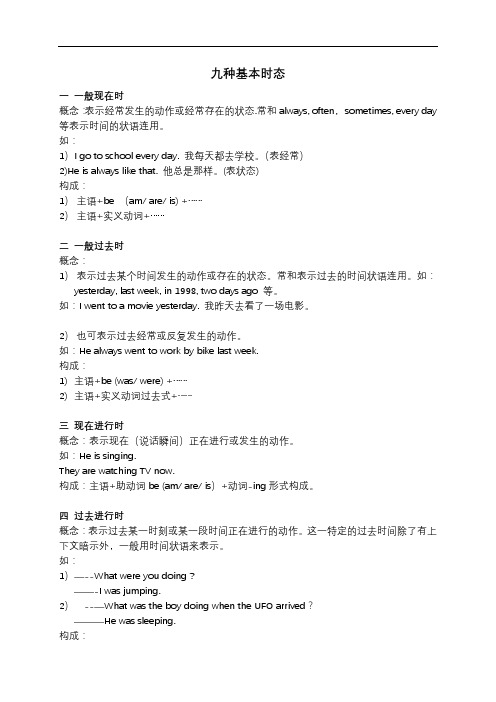
九种基本时态一一般现在时概念:表示经常发生的动作或经常存在的状态.常和always, often,sometimes, every day 等表示时间的状语连用。
如:1)I go to school every day. 我每天都去学校。
(表经常)2)He is always like that. 他总是那样。
(表状态)构成:1)主语+be (am/ are/ is) +……2)主语+实义动词+……二一般过去时概念:1)表示过去某个时间发生的动作或存在的状态。
常和表示过去的时间状语连用。
如:yesterday, last week, in 1998, two days ago 等。
如:I went to a movie yesterday. 我昨天去看了一场电影。
2)也可表示过去经常或反复发生的动作。
如:He always went to work by bike last week.构成:1)主语+be (was/ were) +……2)主语+实义动词过去式+……三现在进行时概念:表示现在(说话瞬间)正在进行或发生的动作。
如:He is singing.They are watching TV now.构成:主语+助动词be (am/ are/ is)+动词-ing形式构成。
四过去进行时概念:表示过去某一时刻或某一段时间正在进行的动作。
这一特定的过去时间除了有上下文暗示外,一般用时间状语来表示。
如:1)—--What were you doing ?——-I was jumping.2)--—What was the boy doing when the UFO arrived?———He was sleeping.构成:主语+助动词be (was/ were) + 动词-ing形式构成。
五一般将来时概念:表示将来某个时间要发生的动作或存在的状态,也表示将来经常或反复发生的动作,常与表示将来的时间状语连用。
最完整的初中英语语法大全

英语语法大全一、词类、句子成分和构词法:1、词类:英语词类分十种:名词、形容词、代词、数词、冠词、动词、副词、介词、连词、感叹词。
1、名词(n.):表示人、事物、地点或抽象概念的名称。
如:boy, morning, bag, ball, class, orange.2、代词(pron。
):主要用来代替名词。
如:who, she, you, it 。
3、形容词(adj。
.):表示人或事物的性质或特征。
如:good, right, white, orange .4、数词(num.):表示数目或事物的顺序。
如:one, two, three, first, second, third, fourth。
5、动词(v.):表示动作或状态。
如:am, is,are,have,see 。
6、副词(adv.):修饰动词、形容词或其他副词,说明时间、地点、程度等。
如:now, very, here, often,quietly, slowly.7、冠词(art.。
):用在名词前,帮助说明名词。
如:a, an, the.8、介词(prep。
): 表示它后面的名词或代词与其他句子成分的关系。
如in, on, from, above, behind。
9、连词(conj。
):用来连接词、短语或句子.如and, but, before 。
10、感叹词(interj.。
)表示喜、怒、哀、乐等感情.如:oh, well, hi, hello。
2、句子成分:英语句子成分分为七种:主语、谓语、宾语、定语、状语、表语、宾语补足语.1、主语是句子所要说的人或事物,回答是“谁"或者“什么”。
通常用名词或代词担任。
如:I’m Miss Green.(我是格林小姐)2、谓语动词说明主语的动作或状态,回答“做(什么)”.主要由动词担任。
如:Jack cleans the room everyday. (杰克每天打扫房间)3、表语在系动词之后,说明主语的身份或特征,回答是“什么"或者“怎么样”.通常由名词、代词或形容词担任。
初中英语语法大全汇总
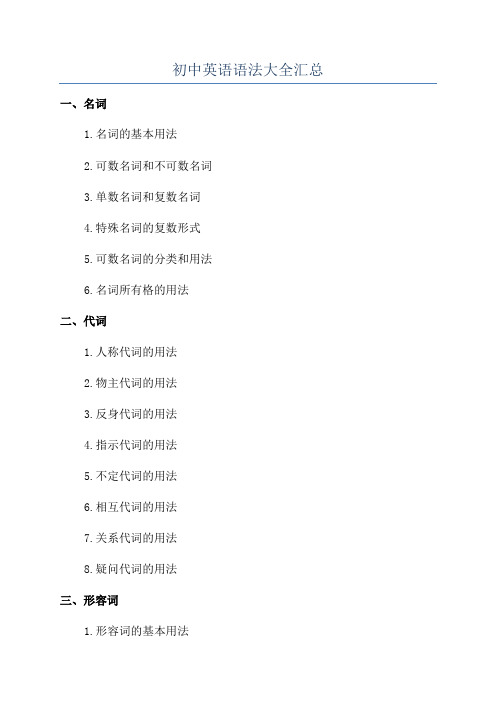
初中英语语法大全汇总一、名词1.名词的基本用法2.可数名词和不可数名词3.单数名词和复数名词4.特殊名词的复数形式5.可数名词的分类和用法6.名词所有格的用法二、代词1.人称代词的用法2.物主代词的用法3.反身代词的用法4.指示代词的用法5.不定代词的用法6.相互代词的用法7.关系代词的用法8.疑问代词的用法三、形容词1.形容词的基本用法2.形容词的比较级和最高级3.形容词修饰的位置4.形容词的用法注意点5.形容词的辨析四、副词1.副词的基本用法2.副词的比较级和最高级3.副词修饰的位置4.副词的用法注意点5.副词的辨析五、动词1.动词的基本用法2.动词的时态和语态3.动词的不定式和动名词4.动词的情态动词5.动词的非谓语用法6.动词的辨析六、冠词1.冠词的基本用法2.定冠词的特殊用法3.不定冠词的特殊用法4.零冠词的用法七、介词1.介词的基本用法2.介词短语的用法3.介词和动词的搭配4.介词和形容词的搭配八、连词1.并列连词的用法2.从属连词的用法3.连词的辨析九、句子结构1.主语和谓语的搭配2.主语和动词的一致性3.宾语和动词的搭配4.宾语和介词的搭配5.宾语和形容词的搭配6.主语和表语的搭配7.主语和宾语补足语的搭配8.主语和定语从句的搭配9.主语和状语从句的搭配十、其他语法知识1.情态动词的用法2.被动语态的构成和用法3.状语从句的类型和用法4.直接引语和间接引语的用法5.名词性从句的用法6.定语从句的用法7.状语从句的用法8.并列句和复合句的用法9.祈使句的用法。
(完整版)初中英语语法大全汇总
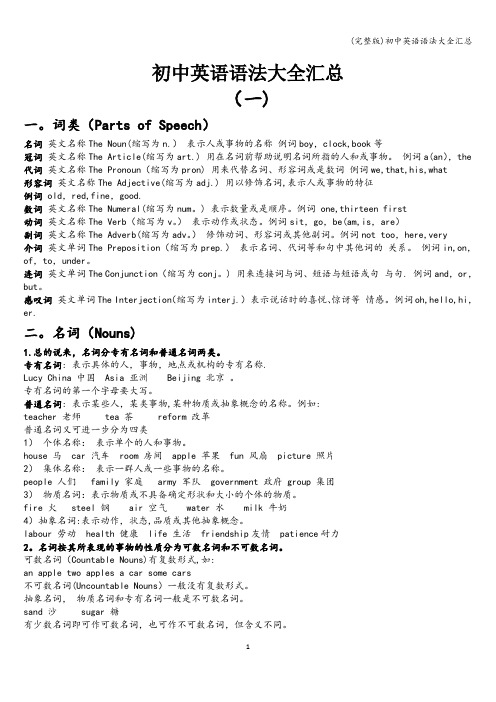
初中英语语法大全汇总(一)一。
词类(Parts of Speech)名词英文名称The Noun(缩写为n.)表示人或事物的名称例词boy,clock,book等冠词英文名称The Article(缩写为art.) 用在名词前帮助说明名词所指的人和或事物。
例词a(an),the 代词英文名称The Pronoun(缩写为pron) 用来代替名词、形容词或是数词例词we,that,his,what形容词英文名称The Adjective(缩写为adj.) 用以修饰名词,表示人或事物的特征例词 old,red,fine,good.数词英文名称The Numeral(缩写为num。
) 表示数量或是顺序。
例词 one,thirteen first动词英文名称The Verb(缩写为v。
)表示动作或状态。
例词sit,go,be(am,is,are)副词英文名称The Adverb(缩写为adv。
)修饰动词、形容词或其他副词。
例词not too,here,very介词英文单词The Preposition(缩写为prep.)表示名词、代词等和句中其他词的关系。
例词in,on,of,to,under。
连词英文单词The Conjunction(缩写为conj。
) 用来连接词与词、短语与短语或句与句. 例词and,or,but。
感叹词英文单词The Interjection(缩写为interj.)表示说话时的喜悦、惊讶等情感。
例词oh,hello,hi,er.二。
名词(Nouns)1.总的说来,名词分专有名词和普通名词两类。
专有名词: 表示具体的人,事物,地点或机构的专有名称.Lucy China 中国Asia 亚洲Beijing 北京。
专有名词的第一个字母要大写。
普通名词: 表示某些人,某类事物,某种物质或抽象概念的名称。
例如:teacher 老师 tea 茶 reform 改革普通名词又可进一步分为四类1)个体名称:表示单个的人和事物。
初中英语语法大全
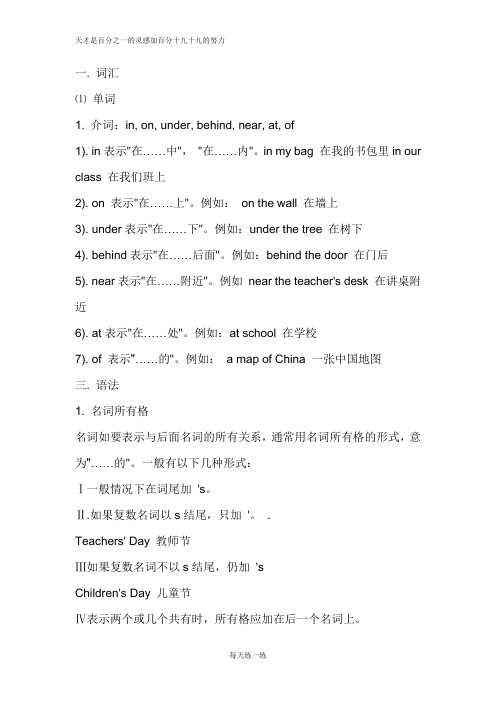
一. 词汇⑴单词1. 介词:in, on, under, behind, near, at, of1). in表示"在……中","在……内"。
in my bag 在我的书包里in our class 在我们班上2). on 表示"在……上"。
例如:on the wall 在墙上3). under表示"在……下"。
例如:under the tree 在树下4). behind表示"在……后面"。
例如:behind the door 在门后5). near表示"在……附近"。
例如near the teacher's desk 在讲桌附近6). at表示"在……处"。
例如:at school 在学校7). of 表示"……的"。
例如:a map of China 一张中国地图三. 语法1. 名词所有格名词如要表示与后面名词的所有关系,通常用名词所有格的形式,意为"……的"。
一般有以下几种形式:Ⅰ一般情况下在词尾加's。
Ⅱ.如果复数名词以s结尾,只加'。
.Teachers' Day 教师节Ⅲ如果复数名词不以s结尾,仍加'sChildren's Day 儿童节Ⅳ表示两个或几个共有时,所有格应加在后一个名词上。
ⅥLucy and Lily's room Lucy 和Lily的房间.动物和无生命事物的名词的所有格一般不在词尾加"'s",而常常用介词of的短语来表示。
2. 祈使句祈使句主要用来表示说话人的请求、命令、建议、叮嘱等意图。
祈使句一般不用主语,读时用降调。
为使语气委婉、礼貌,常在句首或句尾加please 。
在句尾时,please前多用逗号。
初中英语语法大全(整理)
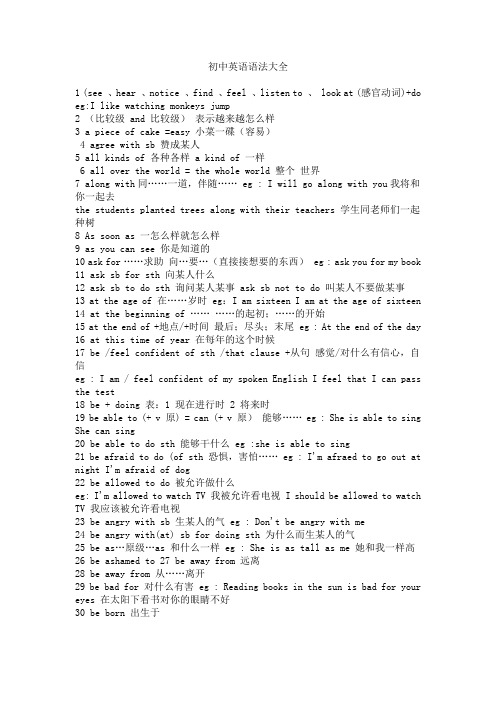
初中英语语法大全1 (see 、hear 、notice 、find 、feel 、listen to 、 look at (感官动词)+do eg:I like watching monkeys jump2 (比较级 and 比较级)表示越来越怎么样3 a piece of cake =easy 小菜一碟(容易)4 agree with sb 赞成某人5 all kinds of 各种各样 a kind of 一样6 all over the world = the whole world 整个世界7 along with同……一道,伴随…… eg : I will go along with you我将和你一起去the students planted trees along with their teachers 学生同老师们一起种树8 As soon as 一怎么样就怎么样9 as you can see 你是知道的10 ask for ……求助向…要…(直接接想要的东西) eg : ask you for my book11 ask sb for sth 向某人什么12 ask sb to do sth 询问某人某事 ask sb not to do 叫某人不要做某事13 at the age of 在……岁时 eg:I am sixteen I am at the age of sixteen14 at the beginning of …… ……的起初;……的开始15 at the end of +地点/+时间最后;尽头;末尾 eg : At the end of the day16 at this time of year 在每年的这个时候17 be /feel confident of sth /that clause +从句感觉/对什么有信心,自信eg : I am / feel confident of my spoken English I feel that I can pass the test18 be + doing 表:1 现在进行时 2 将来时19 be able to (+ v 原) = can (+ v 原)能够…… eg : She is able to sing She can sing20 be able to do sth 能够干什么 eg :she is able to sing21 be afraid to do (of sth 恐惧,害怕…… eg : I'm afraed to go out at night I'm afraid of dog22 be allowed to do 被允许做什么eg: I'm allowed to watch TV 我被允许看电视 I should be allowed to watch TV 我应该被允许看电视23 be angry with sb 生某人的气 eg : Don't be angry with me24 be angry with(at) sb for doing sth 为什么而生某人的气25 be as…原级…as 和什么一样 eg : She is as tall as me 她和我一样高26 be ashamed to 27 be away from 远离28 be away from 从……离开29 be bad for 对什么有害 eg : Reading books in the sun is bad for your eyes 在太阳下看书对你的眼睛不好30 be born 出生于31 be busy doing sth 忙于做什么事 be busy with sth 忙于……32 be careful 当心;小心33 be different from…… 和什么不一样34 be famous for 以……著名35 be friendly to sb 对某人友好36 be from = come from 来自 eg :He is from Bejing He comes from Bejing Is he from Bejing ? Does he come from Bejing ?37 be full of 装满……的 be filled with 充满 eg: the glass is full of water the glass is filled with water38 be glad+to+do/从句39 be going to + v(原)将来时40 be good at(+doing) = do well in 在某方面善长, 善于……41 be good for 对什么有好处 eg : Reading aloud is good for your English42 be happy to do 很高兴做某事43 be helpful to sb 对某人有好处eg : Reading aloud is helpful to you 大声朗读对你有好处Exercising is helpful to your bady 锻炼对你的身体有好处44 be in good health 身体健康45 be in trouble 处于困难中 eg : She is in trouble They are in tronble46 be interested in 对某方面感兴趣47 be late for = come late to 迟到 eg: Be late for class 上课迟到48 be like 像…… eg : I'm like my mother49 be mad at 生某人的气50 be made from 由……制成(制成以后看不见原材料)51 be made of 由……制成(制成以后还看得见原材料)52 be not sure 表不确定53 be on a visit to 参观54 be popular with sb 受某人欢迎55 be quiet 安静 56 be short for 表**的缩写 eg: 陶 is short for 陶俊杰57 be sick in bed 生病在床 58 be sorry to do sth be sorry for sb eg : I am sorry for you59 be sorry to hear that 60 be sorry to trouble sb eg : I am sorry to trouble you61 be strict in doing sth 严于做某事 eg : He's strict in obeying noles62 be strict with sb 对某人要求严格 eg: Some students are not strict with them selves 这些学生对自己不严格63 be strict with sb in sth 某方面对某人严格64 be supposed to do 被要求干什么65 be sure 表确定66 be sure of doing sth 对做某事有信心 eg: He is sure of winning I am sure of learning English well67 be sure of sth 对做某事有信心 eg: I'm sure of my head (my teacher 我相信我的大脑(老师)68 be sure that sth 对做某事有信心 eg: I'm suer that he can pass the test 我相信他能通过考试69 be sure to do sth一定会做某事eg: We are sure to pass the test 我们一定会通过这次考试 We are sure to learn English well 我们一定能学好英语70 be terrified of + 名/动doing 害怕……71 be terrified to do sth 害怕做某事72 be th e same as … 和什么一样73 be used to doing sth 习惯做某事eg: My father is used to getting up early 我爸爸习惯早He is used to sleeping in class 他习惯上课睡觉74 be worth doing 值得做什么75 be(feel) afraid to do sth 害怕做某事be afraid of sth 害怕某物 be afraid that 丛句76 because+句子 because of +短语eg : He was late because he had a headache He was late because of his headache77 begin to do = start to do 开始做某事start…with…=begin…with… 以什么开始什么eg : Let's begin the game with the song I begin to go home78 between…and… 两者之间79 borrow sth from sb 向……借…… lend sth to sb ( lend sb sth 借给……什么东西eg : I borrowed a pen from him he lent a pen to me ( he lent me a pen80 both = the same(as) = not different(from) 表相同81 bother 打扰 bother sb to do stheg : I'm sorry to bother you ,but can you tell me to way to the station 我十分道歉打扰你,但是你能告诉我怎么去车站the problem has been bothering me for weeks 这个问题困扰了我几个周了He's bothering me to lend him money82 by the end of 到……为止83 call sb sth eg : We call him old wang84 care 关心 eg : Don't you care about this country's future ?你为什么不关心国家的未来85 catch up with sb 赶上某人86 chat with sb 和某人闲谈 take sb to + 地点带某人去某地87 come in 进88 come over to 过来89 come up with 提出 eg: Can you come up with a good idea 你能想出一个好办法吗?90 communicate with sb 和某人交流91 consider + doing 考虑做什么 eg : Why not consider going to lu zhou 为什么不考虑去泸州?92 dance to 随着……跳舞 eg : She likes dancing to the music 她喜欢随着音乐跳舞93 decide to do sth 决定做某事94 do a survey of 做某方面的调查95 do better in 在……方面做得更好96 do wrong 做错 97 Don't forget to do sth 不要忘了做某事 98 Don't mind +doing /从句 /名词不要介意……99 each +名(单)每一个…eg : Each student has many books 每一个学生都有一些书 100 end up +doing 101 enjoy +doing喜欢 102 escape from 从……逃跑eg: The prisoners have escaped from the prison犯人从监狱里逃跑出来 103 expect to do sth 期待做某事104 fall down 摔下来 fall off 从哪摔下来 105 fall in love with sb /sth 爱上什么106 far from 离某地远 eg : The school is far from my home 107 find +it +adj +to do 发现做某事怎么样108 find sb/sth +adj 发现什么怎么样 eg : I find the book interesting 109 finish 完成+doing(名词)110 fit to sb = be fit for sb 适合某人 111 forget to do 没有做而忘了forget doing 做了而又忘了 eg: Don't forget to go home I forget closing door 112 from…to… 从某某到某某 eg: From me for her113 get /have sth down 做完,被(别人)做…eg: I have my hair cut 我理了发(头发被剪了)Tom got his bad tooth pulled out 汤母把他的坏牙拔掉了(被牙医拔掉了)114 get a part-time job= find a part-time job 115 get along well with sb = get on well with sb 与某人相处得好116 get along with sb = get on with sb 与某人相处 117 get ready for = be ready for为什么而准备eg : I get ready for math I am ready for math 118 get sb in to trouble 给某人麻119 get sb to do sth120 get…from… 从某处得到某物121 give a talk 做报告 eg: He is give a tall122 give sth to sb give sb sth 给某人某物123 go fish 钓鱼 go swimming 游泳124 go on to do 去做下一件事 go on doing 继续做这件事 125 go out away from go out of126 go to school 上学(用于专业的)go to the school 去学校(不一定是上学) 127 good way to 好方法128 hate to do 讨厌没做过的事 hate doing 讨厌做过的事129 have a party for sb 举办谁的晚会130 have a talk 听报告谈一谈131 have been doing 现在完成进行时 eg : You have been talking You have been sleeping since132 have be en to …( 地方)……去过某过地方have gone to …(地方)去了某地还没回来133 have fun +doing 玩得高兴134 have sth to do 有什么事要做eg: I have a lot of homework to do 我有很多家庭作业要做 I have nothing to do 我没什么事情做135 have to do sth 必须做某事136 have trouble (problem) (in) doing sth 做什么事情有麻烦137 have…time +doing138 have…(时间)…off 放……假 eg: I have month off 我请一个月得假139 hear sb +do/doing 听见某人做某事/正在做某事140 help a lot 很大用处141 help sb with sth \one's sth 帮助某人某事(某方面) help sb (to) do sth 帮助某人做某事142 hope to do sth 希望做某事143 How about(+doing) = What about(+doing)144 how do you like = what do you think of 你对什么的看法145 if : 是否=wethereg: I don't know if (wether) I should go to the party 我不知道我是否应该去参加晚会He don't know if (wether) we will arrive on time tomorrow morning 他不知道我们明天早上是否能准时到达146 if :如果,假如(全部接一般时态)+条件语态从句eg: I'll go to LuZhou if it does't rain 假如明天不下雨,我就去泸州If they change the plan they will let me know 假如他们要改变计划,他们会让我知道的I'll go to England ,if I have enough money next year 如果我明年由足够的钱,我就要去英国147 in one's opinion = sb think 某人认为148 in some ways 在某些方面149 in the end = finally(adv) 最后150 in the north of… 什么在什么的北方(north 北 sowth 南 west 西 east 东)151 in the sun 在太阳下152 increase 增加eg : They've increased the prece of petrol by 3% 他们把石油价增加了3% the population has increased from 12 million ten years ago to 18 million now153 instead of +(名)代替eg: I'd like an apple instead of a pear 我想要苹果,而不要梨子I like English instead of math 我喜欢英语而不喜欢数学154 introduce sb to sb 介绍某人给某人 introduce oneself 自我介绍155 invite sb to do sth 邀请某人做某事156 It takes sb sometime to do sth 做某人花掉某人多少时间eg : It took me 5 minutes to do my homework It takes me half an hour to cook157 It's +adj +for sb to do sth 对某人来说做某事怎么样158 It's +adj +to do 做某事怎么样159 It's +adj for sb 对于某人来说怎么样 It's +adj of sb 对某人来说太怎么样160 It's +adj(for sb) to do(对某人来说)做某事怎么样 It's +adj of sb to do sth 对某人来说做某事太怎么样eg : It's nice of you to help me with my English161 It's a good idea for sb to do sth 对…… 来说是个好主意162 It's important to sb 对某人来说很重要 eg: It's important to me 163 It's time to do sth It's time for sth 到了该去做某事的时间eg : It's time to have class It's time for class 该去上课了164 join = take part in 参加165 just now 刚才166 keep +sb /sth +adj /介词短语让什么保持什么样?167 keep out 不让…… 进入168 keep sb adj 让……保持…… eg: I want to keep my mother happy keep healthy 保持健康169 key to +名词表示:某物的钥匙或某题的答案170 key to… anser to … key 可以是答题或钥匙171 laugh at… 取笑…… eg : Don't langh at others We langhed at the joke 172 learn by oneslfe 自学173 learn from sb 向某人学习 eg: We should learn from Lei Feng174 learn to do sth 学做某事175 let sb do sth 让某人做某事176 Let sb down 让某人失望 eg : We shouldn't let our farents down 我们不应该让我们的父母失望177 live from :离某地远178 live in +大地方 /at +小地方居住在某地 eg: I live in LuZhou She lives at XuanTan179 look after = take care of 照顾照看180 lose one's way 谁迷路 eg : Lose your way 你迷路181 make a decision to do sth 决定做某事182 make friends with sb 和谁成为朋友 eg : I want to make friends with you183 make it early 把时间定的早一点184 make on exhibition of oneself 让某人出洋相185 make sb /n +n 使什么成为什么 eg : I made her my step moller I made you my wife186 make sb /sth +adj 使某人(某物)怎么样 eg : You must made your bed clean187 make sb /sth adj 使某人/某物怎么样188 make sb do sth 让某人做某事 eg : I made him write 我以前让他写189 make up be made up of (被动语态)由……组成190 make…difference to…191 mind sb to do mind one's doing 介意……做什么192 most +名 most of +代193 much too +形容词 194 must be 一定195 need +名词196 need sb do sth 需要某人做某事197 need to do (实义动词) need do (情态动词)198 no /neithr of hate to do no /neithr of hate doing199 no +名词200 not anymore = no more 再也不…… eg: He didn't cry any more He cried no more 他再也不哭201 not… (形、副)at all eg: He's not tall at all she doesn't junp far at all202 not…at all 一点都不203 not…either 表否定,也不 eg : I don't japanse either I don't have sister, either 我也没有姐姐204 not…until 直到……才……eg: I didn't sleep until my mother came back The child didn't stop crying until I give her sugar205 offer / provide sb with sth 给某人提供206 offer sb sth ( offer sth to sb 提供什么东西给某人 eg : I offer you water (I offer water to you 我给你提供水207 on one's way to… 在谁去那的路上208 on the one hand 一方面 on the other hand 另一方面209 on the phone = over the phone 用电话交谈210 on time 准时 in time 及时211 one day =some day =someday 一天,有一天212 one of +可数名词的复数形式213 one to another 一个到另一个214 over and over agin 一遍又一遍的 eg : He cleaned the floor over and over agin215 part-time job 兼职工作 fall-time job 全职工作216 pay for… 付……钱 pay the bill 开钱,付钱217 please +do218 please help yourself219 pleased with sb220 pool into = pore into221 practice +doing 练习做某事222 prefer sth to sth 相对……更喜欢…… eg : I prefer physics to chemisty 在物理和化学中,我更喜欢物理prefer doing to sth 更喜欢去做…不愿意去做… eg: He prefers riding a bike to diving 他更喜欢骑自行车,不开小车prefer to do sth rather than do sth 宁愿做…也不愿eg: My unde prefers to buy a now car rather than repaiv the used one 我叔叔更喜欢买新的车,也不去修旧车prefer sb not to do sth 更愿意… eg: I prefer her not to come 我不喜欢她不来223 pretend to do sth 装着去做什么 pretend that 从句eg : The two cheats pretended to be working very hard 这两个骗子装着努力工作He pretended that he did not know the answer 他装着不知道答案224 rather…than 宁可……也不……eg : I would rather be a doctor than a teacher 我愿肯当医生,也不当老师He likes dogs rather than cats 他喜欢狗,不喜欢猫225 regard…as 把……当作……eg: Please give my best regards to your family 请带我向你的家人我最好的问候I regard you as my friend 我把你当作我的朋友He shows little regard for others 他不爱关心别人226 remid sb about sth 提醒某人什么事 remid sb to do sth 提醒某人做某事eg : he remids me about cooking (he remids me to cook 他提醒我做饭227 remid sb of sth 使某人想起什么eg : the pictures remind me of my school days 这照片使我想起了我的学校the words that (which) the teacher talke to remind me of my mother 228 return sth to sb 还什么东西给某人229 say to oneself 对自己说230 say to sb 对某人说231 sb spend somemoney on sth 花了多少钱在某事上232 sb spend sometime with sb 花了多少时间陪谁233 sb spend sometime(in) doing sth 花了多少时间做某事234 sb with sb +is sb and sb +are235 see sb do 看见某人做过某事 see sb doing 看见某人正在做某事236 seem to do/be +adj 显得怎么样 eg : You seem to be tired You seem to be happy237 send +sb sth 送给某人某物238 send…to…把什么寄到哪里去?239 shock 使……震惊 eg : Oh , It's only you ! You give me a shock 啊,是你呀!吓我一跳240 show sb sth 向某人展示某物 eg : I show her the book.241 show sb sth = show sth to sb 拿什么东西给某人看 eg: Show me your pen Show your pen to me242 show sth to sb 向某人展示某物 eg : I show the book to her.243 some…others… 一些……另一些……244 start…with… 从……开始begin…with… 从……开始245 stay away from 远离……eg : We're told to stay away from the animals whe visiting the zoo 当我们参观zoo 时,我们要远离动物If you want to lose weight you'd better stay auay from the sweet food 徒工你想减肥,你最好远离甜食246 stop doing 停下正在做的事247 stop sb from doing sth 阻止某人做某事248 stop sb(from) doing 阻止某人做某事249 stop to do 停下正在做的事去做下一件事250 such +名这样,这种251 suit sb 适合某人252 surprise sb 使某人惊奇 to one's surprise 令某人惊奇253 take classes 上课254 take sb to 把某人带去 eg : I take you to the hospital255 take walks = take a walk = go for a walk 散步256 ①talk to 对谁说eg : I talk to you ② talk with 和谁说 eg : I talk with him③ talk of 谈到eg : we talked of you ④ talk about 谈论关于……257 talk with sb 和某人说话258 teach sb sth 教某人做某事259 tell sb do sth 告诉某人做某事260 tell sb sth tell sb that 丛句 tell sb not to do sth tell a story 261 tell sb sth 告诉某人某事262 tell sb to do sth 告诉某人做什么 tell sb not to do sth 告诉某人不要做什么263 tell…from…264 thank you for +doing265 the same +名词(doing)+as……266 the same…(名)…as as…(adj adv)…as 相同267 the way to do sth = the way of doing st做某方面的方法the way to +地方去哪的路e g :Do you know the way to learn English Do you know the way of learning English268 the way to…(地点)到哪的269 too…to… 太怎样而不能……ad j +enough to 足够…能… so…that +丛句eg: He is too young to go to school = He is so young that he can't go to schoolHe is old enough to go to school = He is so old that he can go to school 270 transalte ……into…… 把什么翻译成什么 eg : Trasalte English into chinese271 travel with sb和某人去旅游272 try one's best to do sth尽某人最大的努力去做某事eg: I will try my best to learn English well273 try to do sth 想干什么,但没成功 try doing sth 想干什么,已经做过了eg :He tried to climb 他想爬上去,但没成功 He tried climbing 他想爬上去,已经做过了274 try…试衣服 have a try 试一下275 turn down 开小←→ turn up 开大276 turn off 关上←→ turn on 打开 open 拆开 277 upside down 倒着278 visit to… 参观某个地方 279 wait for sb 等某人。
初中英语语法大全

小学部分一、名词复数规则1.一般情况下,直接加-s,如:book-books, bag-bags, cat-cats, bed-beds2.以s. x. sh. ch结尾,加-es,如:bus-buses, box-boxes, brush-brushes, watch-watches3.以“辅音字母y”结尾,变y为i, 再加-es,如:family-families, strawberry-strawberries4.以“f或fe”结尾,变f或fe为v, 再加-es,如:knife-knives Leaf——leaves5.不规则名词复数:man-men, woman-women, policeman-policemen, policewoman-policewomen,child-children foot-feet, tooth-teeth fish-fish, people-people, Chinese-Chinese, Japanese-Japanese二、一般现在时一般现在时基本用法介绍【No. 1】一般现在时的功能1.表示事物或人物的特征、状态。
如:The sky is blue.天空是蓝色的。
2.表示经常性或习惯性的动作。
如:I get up at six every day.我天天六点起床。
3.表示客观现实。
如:The earth goes around the sun.地球绕着太阳转。
一般现在时的构成1. be动词:主语be(am,is,are) 其它。
如: I am a boy.我是一个男孩。
2.行为动词:主语行为动词( 其它)。
如: We study English.我们学习英语。
当主语为第三人称单数(he, she,it)时,要在动词后加"-s"或"-es"。
如:Mary likes Chinese.玛丽喜欢汉语。
【No. 2】一般现在时的变化1. be动词的变化。
初中英语语法知识大全
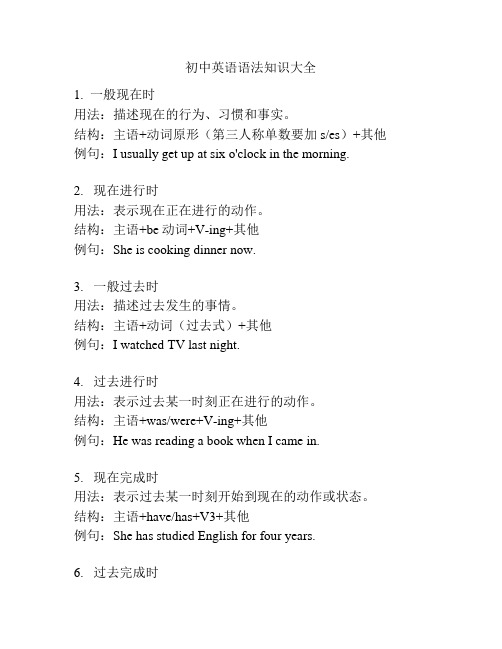
初中英语语法知识大全1. 一般现在时用法:描述现在的行为、习惯和事实。
结构:主语+动词原形(第三人称单数要加s/es)+其他例句:I usually get up at six o'clock in the morning.2. 现在进行时用法:表示现在正在进行的动作。
结构:主语+be动词+V-ing+其他例句:She is cooking dinner now.3. 一般过去时用法:描述过去发生的事情。
结构:主语+动词(过去式)+其他例句:I watched TV last night.4. 过去进行时用法:表示过去某一时刻正在进行的动作。
结构:主语+was/were+V-ing+其他例句:He was reading a book when I came in.5. 现在完成时用法:表示过去某一时刻开始到现在的动作或状态。
结构:主语+have/has+V3+其他例句:She has studied English for four years.6. 过去完成时用法:表示在过去某一时刻之前已经完成的动作。
结构:主语+had+V3+其他例句:I had finished my homework when he came.7. 情态动词用法:表示语气,如能否、可能性、义务、推测等。
例句:We should help each other.8. 动名词用法:表示动作,作主语、表语、宾语等。
例句:Swimming is good exercise.9. 形容词用法:用来描述人或事物的外在或内在特点。
例句:He is a clever boy.10. 副词用法:用来修饰动词、形容词、副词以及句子。
例句:She runs very fast.11. 不定式用法:表示动作的目的、用途、结果、时间等。
例句:I want to go to the cinema.12. 介词用法:表示动态或静态的关系。
例句:I am sitting on the chair.13. 连词用法:连接单词、短语或句子。
初中英语语法大全(精华版)
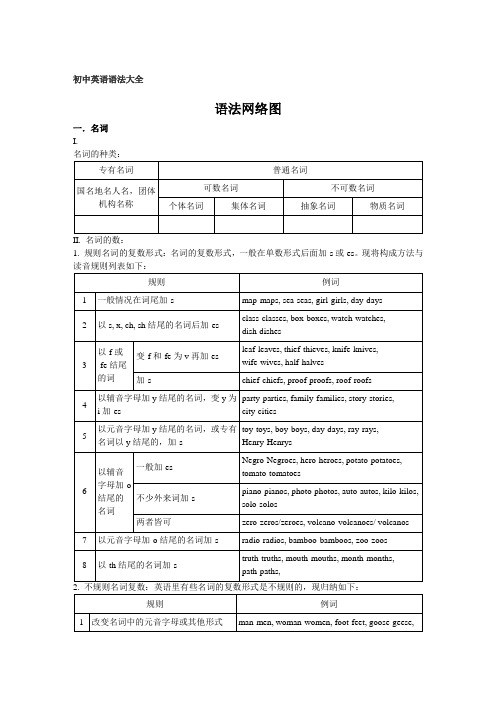
初中英语语法大全语法网络图一.名词I.名词的种类:II. 名词的数:1. 规则名词的复数形式:名词的复数形式,一般在单数形式后面加-s或-es。
现将构成方法与读音规则列表如下:mouse-mice2单复数相同sheep, deer, means, works, fish, yuan, jin, 3只有复数形式trousers, clothes, thanks, goods, glasses, 4一些集体名词总是用作复数people, police5部分集体名词既可以作单数(整体)也可以作复数(成员)class, family, crowd, couple, group, government,population, team, public, party6复数形式表示特别含义customs(海关), times(时代), spirits(情绪), drinks(饮料), sands(沙滩), papers(文件报纸), looks(外表), brains(头脑智力), greens(青菜)7表示“某国人”加-sAmericans, Australians, Germans, Greeks, Swedes,Europeans单复数同形Swiss, Portuguese, Chinese, Japanese以-man或-woman结尾的改为-men,-womenEnglishmen, Frenchwomen8合成名词将主体名词变为复数sons-in-law, lookers-on, passers-by, story-tellers,boy friends无主体名词时将最后一部分变为复数grown-ups, housewives, stopwatches 将两部分变为复数women singers, men servantsIII. 名词的所有格:名词在句中表示所有关系的语法形式叫做名词所有格。
所有格分两种:一是名词词尾加’s构成,二是由介词of加名词构成。
(完整版)初中英语语法知识点归纳
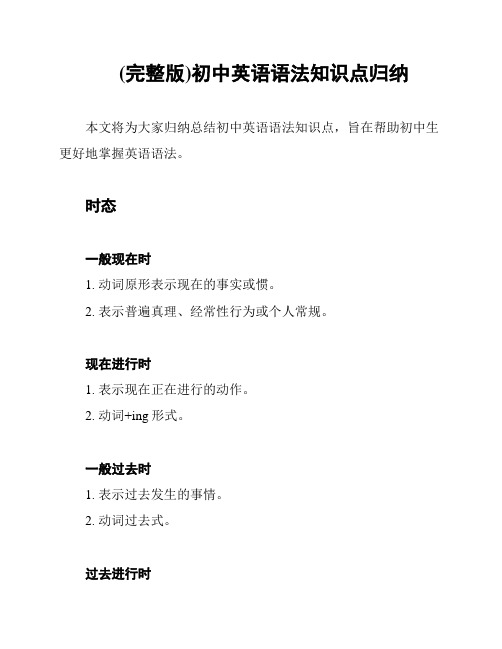
(完整版)初中英语语法知识点归纳本文将为大家归纳总结初中英语语法知识点,旨在帮助初中生更好地掌握英语语法。
时态一般现在时1. 动词原形表示现在的事实或惯。
2. 表示普遍真理、经常性行为或个人常规。
现在进行时1. 表示现在正在进行的动作。
2. 动词+ing形式。
一般过去时1. 表示过去发生的事情。
2. 动词过去式。
过去进行时1. 表示过去某个时间正在进行的动作。
2. was/were + 动词+ing形式。
一般将来时1. 表示将来的动作或状态。
2. will/shall + 动词原形。
语态主动语态1. 表示主语是动作的执行者。
2. 主语 + 动词原形。
被动语态1. 表示主语是动作的承受者。
2. be + 过去分词。
比较级与最高级比较级1. 用于比较两个人或物。
2. 形容词 + er。
最高级1. 用于比较三个或更多人或物。
2. 形容词 + est。
祈使句祈使句1. 表示请求、命令、建议或劝告。
2. 动词原形。
倒装句倒装句1. 将助动词或情态动词提前至主语之前。
2. 系动词be的倒装句:is/am/are/was/were + 主语。
直接引语与间接引语直接引语1. 直接引用他人的话。
2. 用引号将原话括起来。
间接引语1. 用自己的话转述他人的话。
2. 没有引号。
以上是初中英语语法的主要知识点归纳。
希望这份文档能够帮助到您更好地学习和掌握英语语法知识。
初中英语语法(完整版)
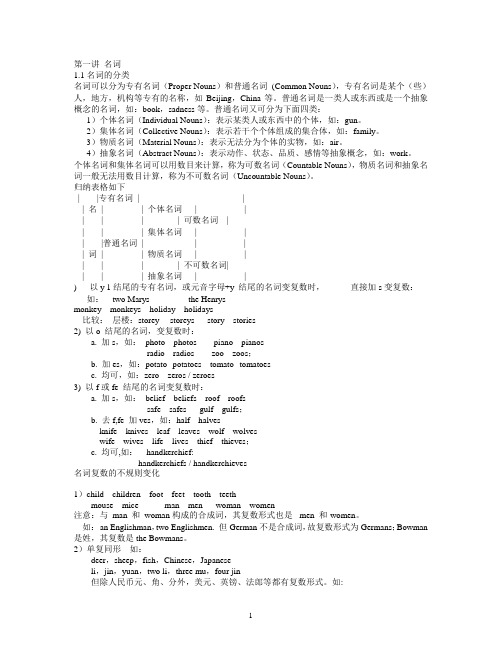
第一讲名词1.1名词的分类名词可以分为专有名词(Proper Nouns)和普通名词(Common Nouns),专有名词是某个(些)人,地方,机构等专有的名称,如Beijing,China等。
普通名词是一类人或东西或是一个抽象概念的名词,如:book,sadness等。
普通名词又可分为下面四类:1)个体名词(Individual Nouns):表示某类人或东西中的个体,如:gun。
2)集体名词(Collective Nouns):表示若干个个体组成的集合体,如:family。
3)物质名词(Material Nouns):表示无法分为个体的实物,如:air。
4)抽象名词(Abstract Nouns):表示动作、状态、品质、感情等抽象概念,如:work。
个体名词和集体名词可以用数目来计算,称为可数名词(Countable Nouns),物质名词和抽象名词一般无法用数目计算,称为不可数名词(Uncountable Nouns)。
归纳表格如下||专有名词||| 名|| 个体名词|||||------------| 可数名词|||| 集体名词||||普通名词|||| 词|| 物质名词|||||------------| 不可数名词|||| 抽象名词||) 以y 1结尾的专有名词,或元音字母+y 结尾的名词变复数时,直接加s变复数:如:two Marys the Henrysmonkey---monkeys holiday---holidays比较:层楼:storey ---storeys story---stories2) 以o 结尾的名词,变复数时:a. 加s,如:photo---photos piano---pianosradio---radios zoo---zoos;b. 加es,如:potato--potatoes tomato--tomatoesc. 均可,如:zero---zeros / zeroes3) 以f或fe 结尾的名词变复数时:a. 加s,如:belief---beliefs roof---roofssafe---safes gulf---gulfs;b. 去f,fe 加ves,如:half---halvesknife---knives leaf---leaves wolf---wolveswife---wives life---lives thief---thieves;c. 均可,如:handkerchief:handkerchiefs / handkerchieves名词复数的不规则变化1)child---children foot---feet tooth---teethmouse---mice man---men woman---women注意:与man 和woman构成的合成词,其复数形式也是-men 和-women。
初中所有英语语法知识

初中所有英语语法知识
初中英语语法知识包括:
1.一般现在时:表示通常性、规律性、习惯性的状态或者动作(或现阶段比较经常发生的动作);表示经常性的动作或状态,常与always,often,usually,sometimes,every day等连用;在由if,unless等引导的假设条件下;在有before,after,as soon as等引导的时间状语从句中;两个祈使句(或表示请求和命令的动词)的并列句。
2.现在进行时:表示现阶段或说话时正在进行的动作;表示离别、穿衣、吃东西等瞬间的动作;动词是be,表示感觉、意识、情感、心理活动等;与always,constantly,forever等连用,表达一种厌烦或赞扬的情感。
3.现在完成时:表示过去发生或完成的动作对现在造成的影响或结果;表示过去已经开始,持续到现在的动作或状态;与for,since 连用;在so far,up to now,so far as I know等短语中;在句型This/That/It is the first/second time+从句中;在定语从句中。
4.一般将来时:表示将来某一时刻的动作或状态;表示将来某一阶段的时间;表示感情色彩的动词,如愿望、决定、请求、命令等,常与表示将来的时间状语连用。
5.祈使句:表示请求、命令、叮嘱、劝告等;主语you常省略,谓语动词用原形;回答祈使句常用not否定。
6.感叹句:How+形容词+主语+谓语!What+名词+主语+谓语!
以上是初中英语语法知识的一些内容,希望能对您有所帮助。
初中英语语法知识归纳

初中英语语法知识归纳初中英语必备语法知识归纳英语是按照分布面积而言最流行的语言,但母语者数量是世界第三,仅次于汉语、西班牙语。
下面店铺为大家带来初中英语必备语法知识归纳,希望大家喜欢!初中英语语法知识归纳篇1一、冠词 a / an 的用法a用于辅音音素前 a useful book, a universityan则用于元音音素前an hour, an honest boy , an “A E F H I L M N O R S X”二、定冠词the的用法:1)特指双方都明白的人或物: Give me the book.2)上文提到过的人或事: ---Do you know the lady in blue? –Yes, she is a teacher of a university.3)指世上独一物二的事物the sun ( sky / moon/ earth/ world/ nature/ universe )4)单数名词连用表示一类事物,如:the dollar 美元; The lion isa wild animal.或与形容词或分词连用,表示一类人:the rich /poor/ blind/ aged / living / impossible5)用在序数词和形容词最高级,及形容词only,very, same等前面:I live on the second floor.6)用在表示身体部位的名词前: She caught me by the arm.7)用在表示乐器和表方位的名词之前:She plays the piano violin guitar in the north of China8)用在普通名词构成专有名词前:the People's Republic of China the United States the Great Wall the Summer Palace9) 用在姓氏的复数名词之前,表示一家人:the Greens are playing the piano.10) in the day, in the morning (afternoon,evening), in themiddle (of), in the end, all the time at the same time on the whole, by the way, go to the cinema at he age of six at the beginning of the twenty-first century on the other side of at the moment the day after tomorrow the day before yesterday, the next morning, in the sky (water,field,country) in the dark, in the rain三、不用定冠词的情况1) 国名,人名前通常不用定冠词:China , Europe 欧洲 Lei Feng 雷锋2)物质名词和抽象名词表示一般概念时,通常不加冠词;当表示特定的意思时,需要加定冠词Failure is the mother of success. 失败乃成功之母。
初中英语语法大全(精华版)

初中英语语法大全(精华版)一、动词时态1. 一般现在时:表示经常性、习惯性的动作或状态。
例如:He goes to school bike every day.(他每天骑自行车上学。
)2. 一般过去时:表示过去某个时间里发生的动作或存在的状态。
例如:She visited her grandparents last weekend.(她上周末去看望了她的祖父母。
)3. 一般将来时:表示将来要发生的动作或状态。
例如:We will have a sports meeting next month.(下个月我们将举行一场运动会。
)4. 现在进行时:表示正在进行的动作或状态。
例如:The boy is reading a book in the library.(这个男孩正在图书馆看书。
)5. 过去进行时:表示过去某个时刻正在进行的动作或状态。
例如:They were watching TV when I called them last night.(昨晚我给他们打电话时,他们正在看电视。
)6. 现在完成时:表示过去发生的动作对现在造成的影响或结果。
例如:I have finished my homework.(我已经完成了我的家庭作业。
)二、名词1. 名词的分类:名词分为可数名词和不可数名词。
可数名词有单数和复数形式,不可数名词没有复数形式。
2. 名词的数:可数名词的复数形式通常在词尾加s或es。
例如:books(书),pencils(铅笔)。
3. 名词的所有格:表示某物属于某人或某事物的关系。
例如:Tom's book(汤姆的书),the teacher's desk(老师的桌子)。
三、冠词1. 不定冠词:a和an。
a用于辅音音素开头的单词前,an用于元音音素开头的单词前。
例如:a dog(一条狗),an apple(一个苹果)。
2. 定冠词:the。
表示特指,指某个特定的人或事物。
初中英语语法知识点大全

初中英语语法知识点大全一、时态1.一般现在时2.一般过去时3.一般将来时4.现在进行时5.过去进行时6.将来进行时7.现在完成时8.过去完成时9.将来完成时二、动词1.动词的基本形式2.动词的第三人称单数形式3.动词的过去式形式4.不规则动词的变化形式5.动词的进行式形式6.动词的完成式形式7.动词的被动语态形式8.动词的否定形式9.动词的疑问形式10.动词的反身形式三、名词1.可数名词2.不可数名词3.单数名词4.复数名词5.特殊复数名词6.形容词作名词7.名词所有格8.名词的单复数形式9.名词的特殊变化形式四、形容词和副词1.形容词的基本用法2.形容词的比较级和最高级3.形容词的位置4.副词的基本用法5.副词的比较级和最高级7.形容词和副词的区别五、代词1.主格代词2.宾格代词3.形容词性物主代词4.名词性物主代词5.指示代词6.反身代词7.不定代词六、冠词和数词1.定冠词2.不定冠词3.零冠词4.数词的基本形式5.数词的序数形式6.数词的基数和序数的用法七、介词1.介词的基本用法3.介词短语4.介词的特殊用法八、连词1.并列连词2.从属连词3.连词的位置九、时态和语态1.时态的选择2.时态的转换3.语态的转换十、虚拟语气1.虚拟语气的基本用法2.虚拟语气的特殊用法十一、直接引语和间接引语1.直接引语和间接引语的基本用法2.直接引语和间接引语的标点符号十二、定语从句和状语从句1.定语从句的引导词2.定语从句的构成3.状语从句的种类4.状语从句的引导词十三、条件状语从句和时间状语从句1.条件状语从句的引导词2.条件状语从句的构成3.时间状语从句的引导词4.时间状语从句的构成十四、目的状语从句和结果状语从句1.目的状语从句的引导词2.目的状语从句的构成3.结果状语从句的引导词4.结果状语从句的构成十五、比较状语从句和让步状语从句1.比较状语从句的引导词2.比较状语从句的构成3.让步状语从句的引导词4.让步状语从句的构成。
- 1、下载文档前请自行甄别文档内容的完整性,平台不提供额外的编辑、内容补充、找答案等附加服务。
- 2、"仅部分预览"的文档,不可在线预览部分如存在完整性等问题,可反馈申请退款(可完整预览的文档不适用该条件!)。
- 3、如文档侵犯您的权益,请联系客服反馈,我们会尽快为您处理(人工客服工作时间:9:00-18:30)。
句子成分句子成分是中国人自己用汉语来理解英语的。
什么叫句子:由一些单词按照一定规则放在一起的。
其中,这一定规则是指语法。
主语:是动作的发出者例如:我打你打是动作我是打的发出者考点:1.it,one , thatIt 同名同物,特指,可以指代人,但不知其身份和性别One 同名异物,泛指,相当于不定代词+可数名词单数That 同名异物,特指,后可接省略it 的宾语从句例如:---Excuse me,I want to buy some stamps. Where can I find a post office?---I know one not far from here.You can easing find it.The area of the bedroom is larger than that of the living room.2.动词不定式做主语动词不定式表示将来要去的,一次性的动词ing形式表示现在正在做或已经做过的,表示主动动词不定式(to do 和do)非谓语动词动词现在分词doing)(不能做谓语)动词的过去分词即done 具有形容词词性,表被动注意:当动词是使役动词make/let/have/notice) 和感官动词(see/watch/hear/listen/taste/smell/feel) 可以省去不定式to做宾语补足语其中,形式主语是考试的重点It's adj. to do sth. it 是形式主语真正的主语是to do sth例如:It is difficult to learn English well.3. There beThere be 表示存在倒装表强调Have 拥有,主语是有生命的例如:There are some students in the classroom. 还原句子Some students are there in the classroom. There 是表语谓语表示动作。
要知道在一个简单句子里,只有一个谓语动词。
如果要加一个其他的动词,一定要把动词变成非谓语动词。
考点:谓语就是时态中的态即状态,而状态是靠谓语动词形式来体现(动词原形,第三人称单数,过去式,现在分词和过去分词)动词{谓语动词(情态动词,助动词,be动词,系动词,实义动词){非谓语动词动词不定式(to do 和do)动词现在分词doing动词的过去分词即done 具有形容词词性,表被动宾语:有主就有宾,动作的承受者。
我打你。
“你” 即是打的承受者。
做宾语的一般有代词、具有名词性质考点:双宾(看离主语的远近)直宾(近)间宾(远)例如:give me(间宾)a book(直宾)=give a book to mebuy me (间宾)a book(直宾)=buy a book for me注意:什么时候用for 或to?去掉间宾,动作能够独立完成用for,不能独立完成的用to一句话中有两个主语,两个谓语,叫做主从复合句,作宾语的是一个句子叫做宾语从句。
一句话中只有一个人称代词时,用宾格人称代词有数、人称、格式的变化人称第一人称第二人称第三人称主宾主宾主宾单数I me you you she he it her him it复数we us you you they them以“我”为中心,近的是第二人称,远的是第三人称人称代词主格做主语,宾格做宾语。
定语:给名词下一个范围,一般是形容词作定语还有定语从句(即做定语的是一个句子)考点:定语在句中的位置当定语是个短语时,放在被修饰词的后面。
例如:I have a lot of homework to do. to do 修饰homework当被修饰的词是复合的不定代词时,形容词要后置不定代词有something anything somebody anybody nobody somewhere 等等状语:说明动作发生的时间、地点、原因、目的、条件等等,用来修饰动词。
例如:He can speak English very _____A goodB well注意:副词修饰动词形容词修饰名词副词一般放在情态动词、助动词、be动词之后,实义动词之前。
Well 做adi 是“健康的”补语:对前面的名词进行补充说明,一般修饰名词或具有名词词性的词,一般是形容词作补语考点:宾语补足语ask sb to do sth make sb do sth see sb to do sth \doing sth例如:We made him copy the sentence.=He is made to copy the sentence by me使役动词变被动要加to表语:表明主语的身份、特征、状态、信息等等,一般是形容词,be动词后面的名词或形容词一般都是表语。
考点:“主---系---表”结构有主才有表作表语的一般是名词、形容词例如:His English is good. He can speak English well.well adv.好的adj 健康的n 井系动词是联系主语和表语的动词,表明主语和表语的关系。
所有系动词没有被动语态。
系动词状态系动词:be /keep/ remain/lie/stay变化系动词:go/turn/come/get/run表象系动词:seem/appear/look like感官系动词:taste/feel/ smell/sound例如:The dish tastes good .无被动语态辨别 e true/realize/achievecome true :变成真的,不是“实现”的含义例如:My dream comes true.realize :实现例如He realized his dream.achieve:实现,达到run out /run out of run out:变没了,不是“花光”run out of :把。
变没了同位语:着重在高考考查。
同位语表强调,放在be动词、助动词后面,实义动词前面。
例如:We are all here.My parents are both teachers.时态一般现在时时间:整个时间轴状态:原型,第三人称单数1.一般现在时包含整个时间轴例如:I usually play soccer after school.过去、现在、将来都会踢足球。
She usually goes to school by bike.做有关动词时态的题,先看主语是不是第三人称单数,如果是,那就要考虑下用不用相对应的第三人称单数形式2.表示客观真理例如:The teacher said the earth goes around the sun.本应时态一致性,但地球围绕太阳转是真理,是事实。
3.Here和there引导的倒装句用一般现在时体现现在进行时。
只有这两种情况。
例如:Here comes the bus.=The bus is coming here.4.一般现在时表将来(1)由and 连接两个先后的动作,and连接两个相同的部分例如:Get up and go to school.(2)祈使句(省略主语的句子表示命令和请求)例如:Go out! Please sit down.(3)按照时间表来进行的动作例如:The bus arrives at 8:00The school starts on 1st September.(4)if 引导的条件状语从句从句用一般现在时态表示将来,主语用一般现在时态表结果。
例如:如果明天天晴,我们就去购物。
If it is sunny tomorrow,we will go shopping.明天天气天晴是条件,只有它是事实,才会有结果。
若是从句也用一般将来时,即有可能是天晴,但也有可能是别的天气。
考点:as soon as 一。
就例如:I will send you an e-mail as soon as I arrive in China.Will/shall/be going to do 表示将来可能会发生并不是一定会发生用一般现在时表将来,那说明到那个时间点一定会发生。
一般过去时时间:过去的时间例如:last week, yesterday, this morning, just now ,the other daythe day before yesterday an hour ago, two years agoafter +一段时间(以过去为基点表示过去的时间)状态:动词过去式例如:I_____a mistake.Please don’t be angry.A. makeB. madeC. had madeD.was making考点:used to do sth 过去常常做某事,但现在不做了例如:I used to live in Qingdao.be used to doing sth表示习惯做某事例如:I’m used to living in Qingdao.be used to do sth被用来做某事例如:You _____ and the money will be used to help the students from poor families.A. is greating apprecitatingB. appreciatesC. has appreciatedD.is greatly appreciated现在进行时时间:现在这个时间点或现在一段时间例如:now , at the moment, these days, these years状态:be(am/is/are)+v-ing作用:表示现在正在进行的动作例如:I’m reading books now.(2) 表示强调例如:I’m writing another book these days.(3) 表示夸张例如:You are always changing your mind.例如:The shop ____at 8:00 am.It _____ for ten hours every day.A.opens;is openB. is opend;opensC.is open; has openedD.opened;opens for+一段时间动词要用持续性动词或表示状态的短语open “打开”是短暂性动词,open可作adj也可作n注意只有open主动和被动是一样的一般将来时态时间:将来的某个时间例如:tomorrow,the day after tomorrow, next week/yearin+一段时间in the future after +时间点状态:will/shall +v原will/shall 在这里是助动词帮助v原构成一般将来时态be going to do sth ,be to do sth, be about to do sth 只用于第一人称,不能接明确的时间做状语,表示在很短时间内会发生的动作作用:表示将来某个时间进行的动作例如:We shall arrive to tomorrow.表示必然的事物例如:His son will be ten years old next year.表示对将来的某个事情的推测例如:You feel better after taking the medicine.注意:介词接名词或具有名词性的词来作介词宾语v-ing 具有名词词性。
